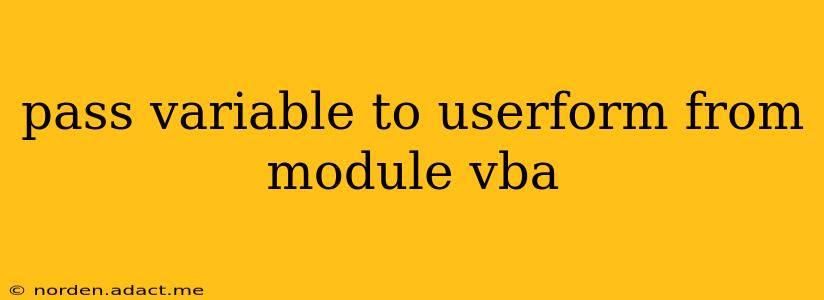Passing Variables to a UserForm from a Module in VBA
Passing variables from a VBA module to a UserForm is a common task in VBA programming, often necessary to pre-populate fields, customize behavior, or share data between different parts of your application. This guide will walk you through several methods, highlighting their strengths and weaknesses.
Method 1: Using Public Variables
This is the simplest approach, ideal for smaller projects or when you need to pass a limited number of variables. Declare the variables in a module using the Public keyword. This makes them accessible from anywhere in your VBA project, including your UserForm.
'In a module (e.g., Module1)
Public myVariable As String
Public myNumber As Integer
Sub InitializeVariables()
myVariable = "Hello from the module!"
myNumber = 123
End Sub
In your UserForm code, you can then directly access these variables:
'In your UserForm code (e.g., UserForm1)
Private Sub UserForm_Initialize()
TextBox1.Text = myVariable
Label1.Caption = myNumber
End Sub
Strengths: Simple and straightforward. Weaknesses: Can lead to spaghetti code in larger projects as variables become globally accessible. Difficult to track variable usage and potential conflicts. Not suitable for complex data structures.
Method 2: Passing Variables as Arguments to UserForm Events
This method is more organized and allows for better control over data flow. You pass variables as arguments to the UserForm's Initialize event or other relevant events.
'In a module
Sub ShowUserForm(variable1 As String, variable2 As Integer)
UserForm1.Show variable1, variable2 'Passing variables as arguments
End Sub
'In your UserForm code
Private Sub UserForm_Initialize(variable1 As String, variable2 As Integer)
TextBox1.Text = variable1
Label1.Caption = variable2
End Sub
Strengths: Cleaner and more manageable than public variables, especially in larger projects. Improves code readability and maintainability.
Weaknesses: Requires modification of the UserForm's Initialize event. Less flexible if you need to pass many variables.
Method 3: Using Properties
This is a more structured approach, especially beneficial when dealing with objects or complex data. You create properties within your UserForm class to encapsulate and manage the data.
'In your UserForm code
Private myVariable As String
Private myNumber As Integer
Public Property Get MyVariable() As String
MyVariable = myVariable
End Property
Public Property Let MyVariable(Value As String)
myVariable = Value
End Property
Public Property Get MyNumber() As Integer
MyNumber = myNumber
End Property
Public Property Let MyNumber(Value As Integer)
myNumber = Value
End Property
Private Sub UserForm_Initialize()
TextBox1.Text = MyVariable
Label1.Caption = MyNumber
End Sub
'In a module
Sub SetUserFormVariables()
UserForm1.MyVariable = "Hello from properties!"
UserForm1.MyNumber = 456
UserForm1.Show
End Sub
Strengths: Encapsulates data within the UserForm, enhancing code organization and maintainability. Suitable for handling complex data structures and objects. Weaknesses: Requires more code than other methods.
Method 4: Using a Class Module
For complex data structures or objects, a Class Module provides the most robust solution. You can create a class to hold all the data you want to pass and then instantiate that class in your module and UserForm.
'In a class module (e.g., clsUserData)
Public myVariable As String
Public myNumber As Integer
'In a module
Sub ShowUserFormWithClass()
Dim userData As clsUserData
Set userData = New clsUserData
userData.myVariable = "Hello from a class!"
userData.myNumber = 789
UserForm1.Show userData
End Sub
'In your UserForm code
Private Sub UserForm_Initialize(userData As clsUserData)
TextBox1.Text = userData.myVariable
Label1.Caption = userData.myNumber
End Sub
Strengths: Excellent for complex data and object-oriented programming. Promotes code reusability and maintainability. Weaknesses: More complex to set up than other methods.
Choosing the Right Method:
The best method depends on your project's complexity and your coding style. For simple scenarios, public variables might suffice. For larger projects, using properties or class modules offers better organization and maintainability. Passing variables as arguments provides a good balance between simplicity and control. Remember to always prioritize code clarity and maintainability.
